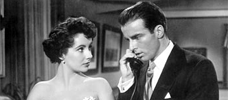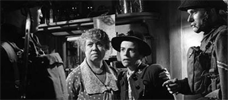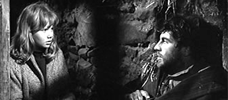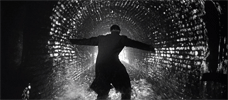Reviews
Peter Glenvile
USA, 1964
Credits
Review by Michael Nordine
Posted on 12 May 2011
Source Netflix Watch Instantly
Categories TCM Classic Film Festival 2011
Ostensibly about a conflict between the crown and the cross, Becket has at its core a more pressing concern with the two men who to embody those sometimes-opposing concepts. Guided by the dual leads of Richard Burton and Peter O’Toole (the title character and his king, respectively), Peter Glenvile’s adaptation of Jean Anouilh’s play Becket or the Honour of God gives the royal treatment to faith, nobility, and human drama. The director interweaves these objects of inquiry into the friendship-turned-feud at the center of his film, treating them not as self-contained tropes but rather as facets of a larger, more personal struggle. (The two threads are from mutually exclusive, and indeed the film explores both, but what bears mention is that the heady arises from the personal rather than the other way around.) This melding of, and tension between, the grand and the intimate eventually comes to shape Glenvile’s film.
Becket is assuredly epic in both scope and its two-and-a-half hour runtime, albeit in unexpected ways. Battles and feasts are replaced by drawn-out conversations in empty halls and a growing sense that the film’s grand set-pieces are merely a means of drawing the viewer into the relationship between Becket and Henry. Power for these men isn’t about exerting their will on underlings; it’s the ability to live life unburdened by such outside forces—unless, in Becket’s case, the force happens to be God. The resultant verbal and mental sparring between Becket and Henry is a film-long affair that breaks down each man to his very core. Each swipe cuts a down layer further, in turn revealing more, and the narrative contrivances that give way to these revelations tend to only be interesting insofar as they define the characters. Becket’s plot at times seems a red herring designed to divert attention away from the fact that the focus of Glenvile’s film is more in his extensive character study than the events that grow out of it.
As a result, the dynamic between the two men is nearly unrivaled for how in-depth and engrossing it is. Henry, though intelligent in his own right, seems at times only nominally in charge; Becket is the hidden hand in many of the King’s decisions involving the church. A peacemaker where others of his kind (and time) are bloodthirsty, Becket’s cerebral tactics are geared toward defusing situations rather than further escalating them. Burton and O’Toole convey all of this with the utmost nuance and, in the case of the former, restraint. The straight man to O’Toole’s showboat, Burton embodies his role in a manner that highlights both Becket’s constant attempts at balancing his king’s grandiosity and the tension that so often results from his efforts. Even in the best of times, theirs is a sometimes uneasy alliance; Henry takes what he wants, including the woman Becket comes closest to loving. Speaking of the effect his advisor has had on him, Henry says thus:
You know, Thomas? Sometimes I think that you and I are the only civilized men in England. I eat with a fork, and you have made me into a man of the utmost delicate sensibilities.
Though undoubtedly a lout, Henry has an endearing nature that goes a long way in masking his flaws. Semi-refined in what are often thought of as uncivilized times, he grasps onto the way things are with Becket even as he himself changes them. The two are rarely apart during the halcyon days of the film’s first hour or so, but there’s no point even during this harmonious time that Becket doesn’t give the sense of being too intelligent to buy into the very notion of regality. He occasionally undermines Henry’s crueler decisions, always with the aim of being just. Becket is loyal, a gifted strategist, and a savvy speaker—in short, everything a go-between should be, save for the fact that his morals far outpace those of the man he answers to. It’s a coup of that man which serves as Becket’s watershed: Henry installs Becket as Archbishop of Canterbury in order to quell his power struggle with the church, believing he’ll fill the position as an inside man and not, as ends up being the case, a faithful devotee.
“Lord, are you sure you’re not laughing at me?” Becket asks once he’s taken on his new role. “It all seems… far too easy.” Being blessed with a life of luxury the likes of which few of his contemporaries can even imagine weighs heavily on Becket, and his turn away from the earthly in order to more humbly serve God comes at the expense of his friendship with Henry II. Distance, hearsay, and the death of a man of the cloth cause the two to further drift apart. Just as their loyalties to one another are called into question, so, too are ours: Becket here enters a moral grey area from which it never fully emerges. Given the means by which Becket gains his title (essentially a sham), it’s easy to doubt not only his qualifications but, more significantly, his sincerity. Henry II is many things - selfish, immature, petty - but he displays these flaws like a bird would its feathers, while Becket shies away from his past in order to be more convincing in his piousness. Neither man is perfect, which is to say they’re more alike than either would readily admit.
More than the ensuing power struggle between Henry II and Becket, it’s their internal battles - Becket to reconcile his loyalties to his King and his God, Henry II to understand that his only true enemy is himself - that carry the film. Ultimately, Henry II emerges as the more compelling figure. A dissatisfied king who wears his heavy crown with a note of apathy, he never achieves the inner peace of his friend. Given his indifference to his wife and child coupled with his obsession with Becket, it’s not unreasonable to conclude that the king may be in love with his former subject. From his unrequited affection is bred a juvenile “if I can’t have him, no one can” mentality that makes his complaints all the more conspicuous to everyone around him but whose real significance never seems to fully register to him. Even in being abandoned by Becket, however, Henry II claims to have been taught one last lesson by him: how to be alone.
What Henry II fails to understand as he ineffectually reminds his subordinates of his power is that he can never rule anybody when he himself is guided by untempered emotions, unfulfilled desires. In the end, when he remains and Becket has been declared a saint, the lasting image emerges of an aging king left speaking to a tomb with no one to answer the words he leaves hanging in the air. Joined only by the silence for which he’s solely responsible, Henry is left in the company of the only man he still considers worthy of his company: himself.
More TCM Classic Film Festival 2011
-

The Outlaw Josey Wales
1976 -

A Place in the Sun
1951 -

Went the Day Well?
1942 -

Becket
1964 -

Whistle Down the Wind
1961 -

The Constant Nymph
1943 -

The Third Man
1949
We don’t do comments anymore, but you may contact us here or find us on Twitter or Facebook.



